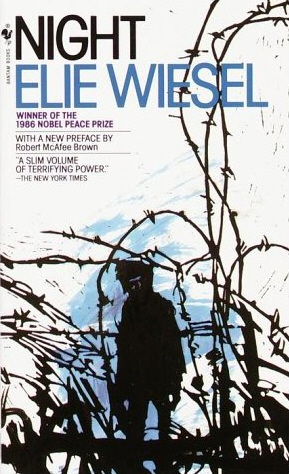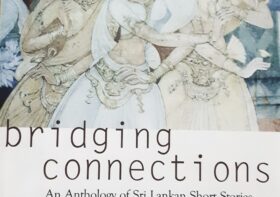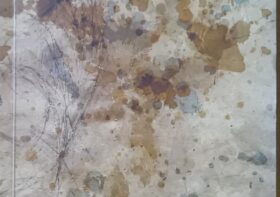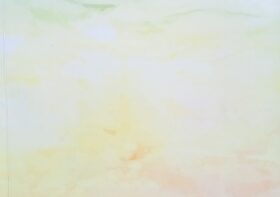Night – Elie Wiesel

వ్యాసకర్త: Nagini Kandala
*******
‘We must always take sides. Neutrality helps the oppressor, never the victim. Silence encourages the tormentor, never the tormented.’ – Elie Wiesel
బ్రెయిన్ పికింగ్స్ లో కొంత కాలం క్రిందట ఈ quote చదివి ‘బావుందే!’ అనుకున్నా. కానీ కొన్ని క్లుప్తమైన పదాల వెనక కూడా అంతులేని కథలుంటాయి, సందర్భానుసారం అవి మారిపోతుంటాయి. Elie Wiesel రాసిన Night చదివాక మళ్ళీ అవే పదాల్ని మరోసారి చదివితే ఆ అర్థం ఇప్పుడు పూర్తిగా వేరేగా అనిపించింది. ఎందుకంటే ఇప్పుడు అవి చదివి కేవలం ‘బావుందే!’ అని మాత్రం అనుకోలేను.
జయాపజయాల కథలు మనం నిరంతరం వింటూనే ఉంటాం. అందులోనూ చరిత్ర విషయానికొస్తే ‘History is written by the winners’ అంటుంటారు. కానీ ఈ విజయం సాధించినవాళ్ళకీ, ఓడిపోయినవాళ్ళకీ మధ్యన చరిత్రలో స్థానానికి నోచుకోని బాధిత వర్గం మరొకటి ఉంటుంది. ఆ వర్గానికి గెలుపోటములతో పనిలేదు, దేవుడు ఉన్నడా లేడా అనే తర్కాలతోనూ పనిలేదు, జీవిత పరమార్థాలు వెతికే అవసరం అంతకంటే లేదు. వారికి కావాల్సిందల్లా కడుపు నింపుకోడానికి కాస్త తిండి, ఈ పూట ప్రాణాలతోనే ఉంటామనే చిన్న ఆశ… రెండో ప్రపంచ యుద్ధ సమయంలో Auschwitz, Buchenwald జర్మనీ కాన్సంట్రేషన్ కాంప్స్ లో తన భయానకమైన అనుభవాలకు అక్షరరూపం ఇస్తూ ఆ వర్గానికి ప్రతినిధిగా తన గళాన్ని వినిపించారు Elie Wiesel . ‘The Diary of Anne Frank’ తరహాలో చరిత్రలో మిగిలిపోయిన అతి ఘోరమైన నిజాలను, మానవత్వం సిగ్గుతో తలవంచుకునే సందర్భాలను ఈ పుస్తకం మరో సారి గుర్తు చేస్తుంది.
NEVER SHALL I FORGET that night, the first night in camp, that turned my life into one long night seven times sealed. Never shall I forget that smoke. Never shall I forget the small faces of the children whose bodies I saw transformed into smoke under a silent sky. Never shall I forget those flames that consumed my faith forever. Never shall I forget the nocturnal silence that deprived me for all eternity of the desire to live. Never shall I forget those moments that murdered my God and my soul and turned my dreams to ashes.Never shall I forget those things, even were I condemned to live as long as God Himself. Never.
ఈ సంవత్సరం అంటే 2016 జులైలో చనిపోయిన ప్రముఖ రచయిత, నోబెల్ శాంతి బహుమతి గ్రహీత Elie Wiesel గురించి ఆ మధ్య గార్డియన్ లో ప్రచురించిన కథనం తరువాత ఆయన గురించి గూగుల్ చేస్తే ఈ ‘Night’ అనే మెమోయిర్ గురించి తెల్సింది. హోలోకాస్ట్ survivor గా 40 పైచిలుకు పుస్తకాలను రాసిన ఆయన తన అనుభవాలను ఈ మెమోయిర్ ద్వారా ప్రపంచానికి చెప్పాలని కోరుకున్నప్పటికీ Jerzy Kosiński రాసిన The Painted Bird అనే మరో పుస్తకంతో దీనికి ఉన్న సారూప్యత వల్ల plagiarism ఆరోపణలు ఆయనకు తలవంపులు తెచ్చాయంటారు. కానీ 1986 లో లభించిన నోబెల్ శాంతి బహుమతి, Oprah Winfrey -TV book club కారణంగా ఈ రచన మళ్ళీ వెలుగులోకి వచ్చింది.
రొమేనియాలోని Sighet లో ఒక జ్యూయిష్ సాంప్రదాయ కుటుంబంలో జన్మించిన 15 ఏళ్ళ కుర్రవాడు Elie Wiesel రెండో ప్రపంచ యుద్ధ సమయంలో తన కుటుంబంతో పాటుగా ఒక Jewish Ghetto కు తరలించబడతాడు. Eliezer, అతని తండ్రి ఆ క్రమంలో తల్లి, చెల్లెలు నుండి విడిపోతారు. అటు పైన 1944-45 మధ్య కాలంలో Auschwitz, Buchenwald కాన్సంట్రేషన్ క్యాంపుల్లో నాజీ జర్మన్ల హింసాత్మకమైన ధోరణులతో తన తండ్రితో పాటుగా చవిచుసిన అవమానాలను, బాధల్నీ ఇందులో వివరించారు. హిట్లర్ ఆధీనంలోని SS (The Schutzstaffel) అని పిలవబడే పారామిలటరీ దళాల ఆక్రమణతో Sighet లోని కొన్ని వందల జ్యూయిష్ కుటుంబాలు తమ ఇల్లూవాకిళ్ళు వదిలేసి cattle cars లో కాన్సంట్రేషన్ క్యాంపులకు తరలించబడ్డారు. వారిలో Elie కుటుంబం కూడా ఒకటి. ఎక్కడకి వెళ్తున్నారో, ఏమి చేస్తున్నారో కూడా తెలీని గందరగోళం మధ్య Jews పాలిట నరకానికి మారు పేరైన Auschwitz కి చేరతారు. పసివారిని సైతం వదలకుండా అక్కడ crematorium లోకి విసిరివేసే నరరూపరాక్షసుల మధ్య, నిరంతరం మనిషి మాంసం వాసనలు వచ్చే crematorium పొగల్ని పీలుస్తూ జీవన్మృత్యువుల మధ్య ప్రత్యక్ష నరకం చూస్తారు. వేలకొద్దీ Jews ఆ క్యాంప్స్ కు తరలించబడగా, చివరకు రెడ్ ఆర్మీ వచ్చి తమను రక్షిస్తుందనే ఒక్క ఆశ కూడా అడుగంటిపోయి, కేవలం 12 మంది మాత్రం బ్రతికి బయట పడతారు. ఆ మిగిలిన వారిలో Elie Wiesel, ఆయన తండ్రి కూడా ఉండగా చివరకు dysentery బారిన పడి ఆయన తండ్రి కూడా మృతి చెందుతారు. కానీ ఆయన మరణానికి ముందు మరచిపోడానికి సాధ్యం కానీ పీడకలలాంటి Auschwitz అనుభవాలను తలుచుకుని పడ్డ వేదనని తాను ఎప్పుడూ మర్చిపోలేనంటారు రచయిత.
But no sooner had we taken a few more steps than we saw the barbed wire of another camp. This one had an iron gate with the overhead inscription:
ARBEIT MACHT FREI. Work makes you free. Auschwitz.
కదిలించే అనుభవాలకు మించిన కథలేముంటాయ్! అందులోనూ సాహిత్యం పాత్ర ఆ యదార్థాలపై అందంగా వేసిన ముసుగుల్ని తొలగించడమేగా. తాను కాన్సంట్రేషన్ క్యాంపులో తన అనుభవాలను రాయడానికి గల కారణాలను వివరిస్తూ ఈ రచన చదివిన తరువాతైనా మళ్ళీ ఇలాంటి ఘోరాలు చరిత్రలో పునరావృతం కాకుండా చూసుకోవలసిన బాధ్యత మానవాళికి ఉందని చెప్పడమే అంటారు Elie Wiesel. నవల చాలా చిన్నది. అనవసర వర్ణనలు లేకుండా రచయిత తన అనుభవాలను సూటిగా, క్లుప్తంగా చెప్పుకొస్తారు. చరిత్రలో ఇటువంటి చీకటి కోణాల గురించి తెలుసుకుంటే కొంతకాలం క్రితం ఒక మిత్రులు అన్నట్లు, “చాలా మంది మనిషి ఉనికి ఇప్పుడు చాలా విపత్కర పరిస్థితుల్లో ఉందని తరచూ వాపోతుంటారు, కానీ నిజానికి ఇప్పుడు మానవ జాతి చాలా సౌకర్యవంతమైన సమాజంలో జీవిస్తోంది” అనే విషయం నిజమేననిపించకమానదు. జాతివర్గవైషమ్యాలతో మనుషులకీ, మృగాలకీ తేడా మర్చిపోయిన హిట్లర్ శకం ‘suffering’ అనే పదానికి మన నిర్వచనాలను సమూలంగా మార్చుకునేలా చేస్తుంది. ఈ రచన చదివినవారు మానవత్వం, దైవత్వం అనే అంశాలపై తమ అభిప్రాయాలను మరోమారు పునఃసమీక్షించుకుంటారు.
రచయిత సమస్త మానవజాతి సిగ్గుపడే తరహాలో నాజీల వ్యవహారశైలి ని గురించి చెప్తూ సనాతన కుటుంబంలో జన్మించిన తనకు దేవుని మీద, అసలాయన ఉనికి మీదే నమ్మకం సడలిన క్షణాలను గురించి ఈ విధంగా రాస్తారు.
”Yisgadal, veyiskadash, shmey raba…May His name be celebrated and sanctified…” whispered my father. For the first time, I felt anger rising within me. Why should I sanctify His name? The Almighty, the eternal and terrible Master of the Universe, chose to be silent. What was there to thank Him for?
What are You, my God? I thought angrily. How do You compare to this stricken mass gathered to affirm to You their faith, their anger, their defiance? What does Your grandeur mean, Master of the Universe, in the face of all this cowardice, this decay, and this misery? Why do you go on troubling these poor people’s wounded minds, their ailing bodies?
Blessed be God’s name? Why, but why would I bless Him? Every fiber in me rebelled. Because He caused thousands of children to burn in His mass graves? Because He kept six crematoria working day and night, including Sabbath and the Holy Days? Because in His great might, He had created Auschwitz, Birkenau, Buna, and so many other factories of death? How could I say to Him: Blessed be Thou, Almighty, Master of the Universe, who chose us among all nations to be tortured day and night, to watch as our fathers, our mothers, our brothers end up in the furnaces? Praised be Thy Holy Name, for having chosen us to be slaughtered on Thine altar?
ఇంత ఘోరం జరుగుతుంటే మిగతా ప్రపంచం ఊరుకోదు. మన చుట్టూ ఉన్న మానవ సమాజం ఈ దారుణాల్ని చూస్తూ మౌనంగా ఉండదు అని అనుకున్న ప్రతి క్షణం కలిగిన నిరాశను ఇలా వ్యక్తపరిచారు.
My forehead was covered with cold sweat. Still, I told him that I could not believe that human beings were being burned in our times; the world would never tolerate such crimes…
“The world? The world is not interested in us. Today, everything is possible,even the crematoria.
We had fallen into the trap, up to our necks. The doors were nailed, the way back irrevocably cut off. The world had become a hermetically sealed cattle car.
కాళ్లకు చెప్పుల్ని కూడా ఉండనివ్వకుండా తీసేసుకున్న అధికారులనుంచి తన జత చెప్పులు దాచుకున్న సమయంలో,దేవుడికి కృతజ్ఞతలు చెప్పిన ఆయన మాటల్లో వ్యంగ్యంతో కూడిన కోపం ధ్వనిస్తుంది..
I had new shoes myself. But as they were covered with a thick coat of mud, they had not been noticed. I thanked God,in an improvised prayer, for having created mud in His infinite and wondrous universe.
మరో సందర్భంలో అందర్నీ వివస్త్రుల్ని చేసి నిల్చోబెట్టిన సందర్భంలో నగ్నత్వాన్ని సమానత్వానికి ముడిపెడుతూ ఇలా అంటారు.
“Strip! Hurry up! Raus! Hold on only to your belt and your shoes…” Our clothes were to be thrown on the floor at the back of the barrack. There was a pile there already. New suits, old ones, torn overcoats, rags. For us it meant true equality: nakedness. We trembled in the cold.
At that moment in time, all that mattered to me was my daily bowl of soup, my crust of stale bread. The bread, the soup— those were my entire life. I was nothing but a body. Perhaps even less: a famished stomach. The stomach alone was measuring time.
“Bite your lips, little brother…Don’t cry. Keep your anger, your hate, for another day, for later. The day will come but not now…Wait. Clench your teeth and wait…”
పుస్తకంలో పలు సందర్భాల్లో రచయిత అనుభవాలు హ్యుమానిటీ గురించీ,Existence of God గురించీ లేవనెత్తే పలు ప్రశ్నలు మనల్ని ఆలోచనలో పడేస్తాయి.
In those days, I fully believed that the salvation of the world depended on every one of my deeds, on every one of my prayers. But now, I no longer pleaded for anything. I was no longer able to lament. On the contrary, I felt very strong. I was the accuser,God the accused. My eyes had opened and I was alone, terribly alone in a world without God, without man. Without love or mercy. I was nothing but ashes now, but I felt myself to be stronger than this Almighty to whom my life had been bound for so long. In the midst of these men assembled for prayer, I felt like an observer,a stranger.
I did not fast. First of all, to please my father who had forbidden me to do so. And then, there was no longer any reason for me to fast. I no longer accepted God’s silence. As I swallowed my ration of soup, I turned that act into a symbol of rebellion, of protest against Him.And I nibbled on my crust of bread. Deep inside me, I felt a great void opening.
ఒక తోటి Jew కు హిట్లర్ మీద ఉన్న అభిప్రాయం….
My faceless neighbor spoke up: “Don’t be deluded. Hitler has made it clear that he will annihilate all Jews before the clock strikes twelve.”
I exploded: “What do you care what he said? Would you want us to consider him a prophet?”
His cold eyes stared at me. At last, he said wearily: “I have more faith in Hitler than in anyone else. He alone has kept his promises, all his promises, to the Jewish people.
అక్కడి మనుషుల దారుణమైన పరిస్థితుల్ని వివరిస్తూ రచయిత చెప్పే ఈ మాటలు అక్కడి భీతావహ వాతావరణానికి దర్పణం పడతాయి.
We each had put on several garments, one over the other, to better protect ourselves from the cold. Poor clowns, wider than tall, more dead than alive, poor creatures whose ghostly faces peeked out from layers of prisoner’s clothes! Poor clowns!
We were the masters of nature, the masters of the world. We had transcended everything—death, fatigue, our natural needs. We were stronger than cold and hunger, stronger than the guns and the desire to die, doomed and rootless, nothing but numbers, we were the only men on earth.
The darkness enveloped us. All I could hear was the violin, and it was as if Juliek’s soul had become his bow. He was playing his life. His whole being was gliding over the strings. His unfulfilled hopes. His charred past, his extinguished future. He played that which he would never play again.
OUR FIRST ACT AS FREE MEN was to throw ourselves onto the provisions. That’s all we thought about. No thought of revenge, or of parents. Only of bread.




varaprasaad.k
నాటి పారిస్తుతులను చక్కగా వివరించారు,సమీక్ష చాలా బావుంది.